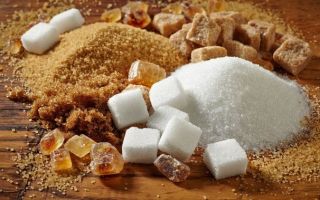Content
- 1 Which is better: sweetener or sugar
- 2 Are sweeteners harmful
- 3 The benefits of sweeteners
- 4 Indications for the use of sweeteners
- 5 Types of sweeteners
- 5.1 Natural sugar substitutes
- 5.2 Synthetic sweeteners
- 5.3 What is the most harmless sweetener
- 5.4 What sugar substitutes can be used for diabetes
- 5.5 Which sweetener is better for pregnant women
- 5.6 Is it possible to give sweeteners to children
- 5.7 Sugar substitutes for weight loss
- 5.8 Daily intake of sugar substitutes
- 5.9 Conclusion
- 6 Reviews of doctors
The variety of modern food products leads to the fact that many of them are exchanged for analogues with useful properties. This rule applies to artificial sweeteners. They are created in order to counteract the harmful effects of natural beet or cane sugar. The benefits and harms of sweeteners are a topic of much debate.
Which is better: sweetener or sugar
With the advent of substitutes, the controversy over the health benefits and harms of sugar has grown fierce. Many people strive to completely eliminate sugar from their diet. Is such a measure justified? Does the sweetener do more harm than good to the human body? To find out, you need to understand what sugar is and how you can replace it.
Sugar, granulated sugar, refined sugar is called sucrose. It is obtained from sugar beets or cane. Additional sources of sugar are known: maple, palm, sorghum, but they are less common.
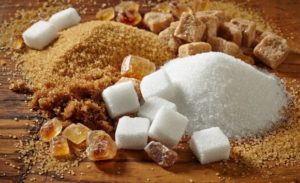
Sucrose is an element of the food chain: it is a representative of carbohydrates that are necessary for humans. When it enters the body, it breaks down into fructose and glucose. Glucose satisfies more than half of the energy consumption of the human body.
The researchers argue that excessive use is undeniable harm. Sugar is a participant and provocateur of many reactions that entail changes in the work of different systems.
Sweeteners are designed to minimize the harm from eating natural sugar. These are chemicals with a sweet taste. Among them it is customary to distinguish:
- sugar substitutes;
- sweeteners.
The components of both groups are classified as low-calorie and no-calorie foods. The answers to the questions about which is better: sucrose or sugar substitute, what are the benefits and harms of both substances, depend on the type of sweetener and the need for this replacement.
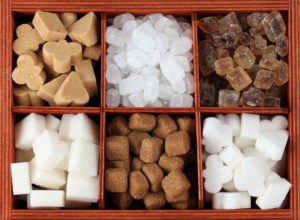
Are sweeteners harmful
Discussions about the benefits and dangers of sugar substitutes for a healthy person should begin with the fact that these are special chemical compounds created in an artificial way. This formulation does not apply to natural sweeteners, which include honey and fruits.
The chemical compounds that manufacturers use to create a product can have some side effects:
- aspartame often becomes a headache provocateur, provokes insomnia and increases appetite;
- saccharin known as a participant in the processes that result in the formation of cancer cells;
- sorbitol and xylitol provoke an influx of bile, which does not always have a positive effect on the state of the pancreas, have a laxative effect;
- suklamat tends to cause an allergic reaction.
The benefits of sweeteners
Useful properties of natural sweeteners are considered their natural composition, the absence of side effects.
Sugar substitutes are often necessary for people suffering from both types of diabetes, obesity, liver disease associated with the inability to break down fructose.
They are low in calories and are suitable for those who watch their diet. They have convenient dispensers that do not allow you to use them uncontrollably.
Indications for the use of sweeteners
The beneficial properties of sweeteners are used when prescribing treatment and diet for people suffering from various diseases.
They are recommended:
- with diabetes;
- obesity, overweight;
- liver diseases;
- anorexia;
- dehydration.
Types of sweeteners
The benefits and harms of sweeteners depend entirely on the type of compound. To protect yourself, not to harm your health, you must carefully analyze all the properties of the products before making a choice.
Natural sugar substitutes
This group has useful properties. They are isolated from natural raw materials, therefore they are considered natural.
|
characteristic |
fructose |
stevia |
xylitol |
sorbitol |
|
where is contained |
fruits, berries, honey |
herbaceous plant |
timber, agricultural plant waste |
stone fruits, algae, corn stalks |
|
sweetness indicators |
2 times sweeter than sugar |
200 times sweeter than sugar |
like sugar |
less by 2 times |
|
calorie content |
like sugar |
0 |
2 times more than sugar |
1.5 times higher |
|
daily consumption rate |
no more than 30 g |
no more than 45 g |
no more than 50 g |
no more than 45 g |
Synthetic sweeteners
The benefits or harms of synthetic sweeteners depend on the type and composition.
- Aspartame... Patented as a food additive E951. It is 200 times sweeter than sucrose, with a caloric value of 4 kcal per 100 g. It is produced in the form of tablets, added to drinks, yoghurts, vitamins. The product ranks 2nd in the world among famous sweeteners. A significant disadvantage of this type is that it can be harmful if consumed after heating. High temperatures provoke the release of harmful substances. Because of this property, it is not recommended for use in cooked dishes.
- Saccharin... It is 300 - 500 times sweeter than sucrose, is not absorbed by the body, excreted in the urine. Registered as a food supplement E954, it is used by people with diabetes. It is added to sodas and sugary foods with a long shelf life. Saccharin is completely banned in European countries as a carcinogenic substance.
- Sucraclose... Known as E955 food additive. It has a bright taste that is 600 times sweeter than sucrose. In the course of research over the past decades, no side effects from use have been identified. Many experiments took place in the provinces of Canada: it is there that sucraclose is more common, it has been used for the past 15 years and is considered a useful additive.
- Sucrasite... It is a dietary supplement that is approved for use by diabetics. Disadvantages: May be toxic if taken in excess due to the content of fumaric acid.
- Cyclamate... This sweetener is isolated from calcium and sodium salts. It is a crystalline powder that dissolves in water. It is 50 times sweeter than sugar and belongs to the type of zero-calorie substitutes. The laxative side effect of this substance on the body is known.
What is the most harmless sweetener
Among the variety of offered products, those that are most useful for the body are selected. Experts recommend sweeteners based on:
- stevia;
- sucralose.
Knowing the properties of these popular sweeteners, you can make your own, your own choice, which of them can effectively replace sugar without harming the body
Sucralose properties:
- it is made from sugar
- it tastes 600 times sweeter than sugar;
- the glycemic index is zero, which means it does not affect blood sugar levels;
- it retains its characteristics after heat treatment;
- does not have an unpleasant aftertaste;
- excreted from the body within 24 hours.
The main disadvantage is the need to limit its dosage at the rate of 0.5 g per 1 kg of weight, otherwise you can get unpleasant consequences in the form of body fat.
Compared to sucralose, stevia has:
- vegetable origin;
- vegetable origin;
- sweet properties 25 times higher than sugar;
- very low calorie content: 18 kcal per 100 g;
- zero GI and the ability to nourish the pancreas and restore its functions;
- does not change the quality during heat treatment;
- powerful antiseptic and restorative properties of the plant;
- no dosage restrictions.
The disadvantages of stevia include a specific herb flavor (which is absent in the powder).
These can be both independent products and complex formulations.
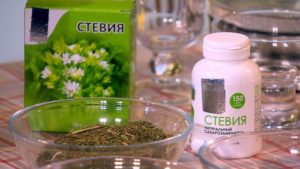
What sugar substitutes can be used for diabetes
The main problem for those with diabetic conditions is constant monitoring of the increase in blood glucose levels. To reduce performance, it is recommended to use synthetic types. Their benefits for diabetics
- reduced calorie level;
- improvement of metabolic processes.
The benefit of sugar substitutes for diabetes lies in the ability to minimize the risk of increased blood counts while satisfying taste buds.
Many experts advise using sorbitol. Its properties are suitable for diabetics in several ways:
- does not affect blood sugar levels;
- absorbed without insulin;
- soluble in water, may be exposed to high temperatures;
- has choleretic properties;
- in taste, it is close to sugar.
In the food industry, sorbitol is often used as an additive in the preparation of foods for diabetics.
Which sweetener is better for pregnant women
The period of pregnancy is characterized by the fact that women choose high-quality healthy products and monitor the use of sucrose, otherwise the fetal development of the child can be harmed.
Artificial sweeteners are contraindicated in pregnant women. They are advised to choose stevia as a substitute or take natural fructose, which is found in honey and healthy fruits.
Is it possible to give sweeteners to children
When forming useful habits in children, it is recommended to use familiar schemes. In a family where there are no rules for replacing sucrose, they should not be changed. Children should adhere to their normal diet. The amount of sweets must be controlled to reduce the risks of harm to the child's body.
Sugar substitutes for weight loss
Many women often ask what is more from the use of sugar substitutes for weight loss: harm or benefit.
When losing weight, natural sweeteners are recommended that do not have low calorie values, but despite this, contribute to the active breakdown of carbohydrates and their conversion into energy.
Sucralose is considered the best option from synthetic species for those who want to lose weight. The advantage of this substitute is that it has the property of not participating in the assimilation processes. It is excreted from the body without leaving a trace.
Daily intake of sugar substitutes
The daily allowance for each synthetic type drug is indicated on the package. The boundaries are between 30 - 50 g daily.Tablets, powders, liquids are added to tea and other drinks. For baking, use free-flowing forms.
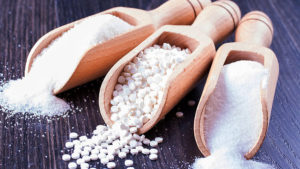
Conclusion
The benefits and harms of a sweetener are a matter of constant discussion between those who seek to control the quality and quantity of food consumed. Choosing a sugar substitute should begin with careful consideration of the properties and health benefits of the recommended sweetener.
Reviews of doctors


